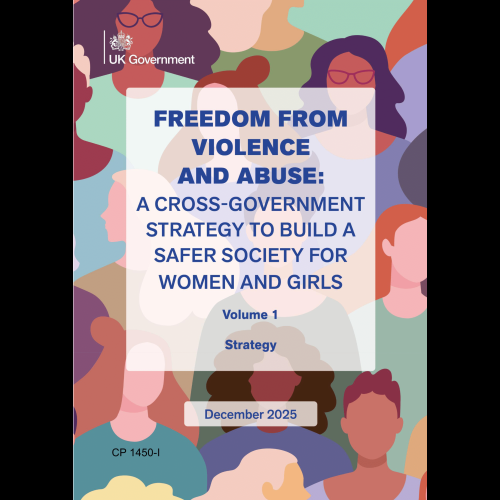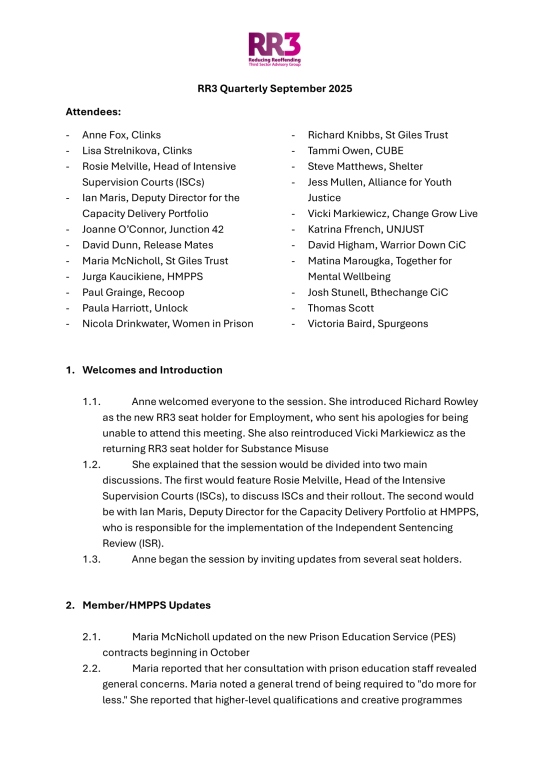What is the Covid-19 Special Interest Group?
The Reducing Reoffending Third Sector Advisory Group (RR3) has set up a Special Interest Group (SIG) on Covid-19, in order to formally channel policy suggestions to the government on how they can protect people in contact with the criminal justice system and their families, and ensure the future of the voluntary sector working in criminal justice.
The RR3 is a formal voluntary sector advisory group to the government, consisting of 16 senior voluntary sector leaders, which is chaired and coordinated by Clinks. The Covid-19 SIG is sponsored by Peter Dawson, Prison Reform Trust and Nicky Park, St Giles and consists of RR3 members, plus additional experts co-opted for their specialist expertise. The group meets weekly to make recommendations to the government.
This blog shares the key points that emerged from the seventh meeting of the group on 30th April 2020.
Is there a shift in focus on population management in prison?
At the meeting, the group discussed the possible implications of findings of an interim assessment of the strategies implemented in prison in response to the Covid-19 pandemic. The assessment suggests that the approach taken by Her Majesty’s Prison and Probation Service (HMPPS) to limit infections in the estate has largely been successful in preventing an ‘explosive outbreak’ of Covid-19 in prisons.
The approach taken to date has involved three primary strategies; first to enhance social distancing by stopping all visits and restricting movement of people within prisons; second to identify and protect the most vulnerable to Covid-19; and third to compartmentalise the prison estate. This includes establishing protective isolation and shielding units and units for new entries into prison. Evidence suggests once a specific outbreak in a prison has been contained, new infections have been driven primarily by new receptions into prison and possibly by infected staff working in prisons.
In an accompanying press release, the government state that new modelling shows that reducing the prison population by 5,000 could be effective in limiting the spread of the virus. The population has already reduced by almost 3,000 over a seven-week period, largely due to the reduction in court activity and prison receptions.
What the group feels this indicates however, is a possible shift away from a focus on early release. The scheme has been slow, and the overall numbers released through the programme is minimal. The government believes the virus can be contained in prisons through a further reduction of just 2,000 people in prison, which would largely be achieved through normal releases and reductions in receptions.
As members of the SIG raised in the meeting, this approach also presents other challenges. The existing regime is highly restrictive and it looks as though this will be the norm for some time. This would mean voluntary organisations are unable to access prisons at a time when their services are most required and people in prison will face increasing mental health challenges as family visits, access to education, jobs or purposeful activity remain impossible. This would have long-term implications for conditions in prison and the welfare of service users.
Next week, the group will address some of these issues of prison population management, to consider how we can support government to think ahead about re-establishing a normal regime in prison and remobilise voluntary sector support services.
Looking forward: how the group will support government
Everyone - both across the voluntary sector and in government - is facing enormous challenges at this time. Following seven weeks of meetings however, members of the RR3 SIG have at times felt frustrated at the quality of responses from government to its recommendations, and the way that information has flowed from the Ministry of Justice and HMPPS. We continue to hold open and frank conversation with officials, and new processes for engagement are being established through a dedicated third sector task force. We will continue to improve how we work together to make sure the voluntary sector and the government can support each other to improve outcomes at this difficult time.
One way we will work is to support officials through focussed thematic conversations and meetings that can be convened around particular live issues. The specialist policy and operational expertise of voluntary sector organisations can then be harnessed in a more dynamic way to work through and refine particular policies and processes. The group have already worked in this way - most recently, a specific meeting was arranged through the RR3 SIG with Khidmat Centres, the Zahid Mubarek Trust, Maslaha and BTEG around support for Muslim prisoners during Ramadan.
What else Clinks is doing
This is an unsettling time for everyone and we know there is a lot of fast-changing information which can be overwhelming and difficult to navigate. Clinks and the National Criminal Justice Arts Alliance have therefore produced a webpage which provides sector-specific information, signposts to helpful information from the wider voluntary sector, and answers some frequently asked questions.
We are running a survey every two weeks to help us track the impact on voluntary organisations working in criminal justice. Our surveys look at the impact on operational delivery; staff and volunteers; finances; and arts provision in prisons. See insights from the second survey here.
We also have a mailbox - covid19@clinks.org - for voluntary organisations working in the criminal justice system who have concerns or questions regarding how Covid-19 will affect their operations or the information they should provide to service users. Organisations should direct queries to their local contact or contract managers where possible, and submit specific questions to the mailbox if you’re struggling to get them answered.
What's new
Blogs
Violence Against Women and Girls (VAWG) Strategy Blog
Publications
Latest on X
The role is for a leader from an organisation focused on racially minoritised people, with expertise in service delivery, policy, advocacy, or related areas in criminal justice. Racial disparities are present at every CJS stage. This role ensures these voices are central in shaping policy to help address and eradicate them. Apply by Mon 18 Nov, 10am. More info: https://www.clinks.org/voluntary-community-sector/vacancies/15566 #CriminalJustice #RR3 #RacialEquity

